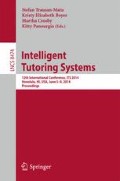Abstract
Collaborative learning has been shown to be beneficial for older students, but there has not been much research to show if these results transfer to elementary school students. In addition, collaborative and individual modes of instruction may be better for acquiring different types of knowledge. Collaborative Intelligent Tutoring Systems (ITS) provide a platform that may be able to provide both the cognitive and collaborative support that students need. This paper presents a study comparing collaborative and individual methods while receiving instruction on either procedural or conceptual knowledge. The collaborative groups had the same learning gains as the individual groups in both the procedural and conceptual learning conditions but were able to do so with fewer problems. This work indicates that by embedding collaboration scripts in ITSs, collaborative learning can be an effective instructional method even with young children.
Access this chapter
Tax calculation will be finalised at checkout
Purchases are for personal use only
Preview
Unable to display preview. Download preview PDF.
References
Chen, W., Looi, C.: Group Scribbles-Supported Collaborative Learning in a Primary Grade 5 Science Class. In: Suthers, D.D., Lund, K., Rose, C.P., Teplovs, C., Law, N. (eds.) Productive Multivocality in the Analysis of Group Interactions, pp. 257–263. Springer, New York (2013)
Dillenbourg, P., Jermann, P.: Designing integrative scripts. In: Scripting Computer-Supported Communication of Knowledge. Cognitive, computational, and educational perspectives, pp. 275–301. Springer, New York (2007)
Gillies, R.M., Boyle, M.: Teachers’ reflections on cooperative learning: Issues of implementation. Teaching and Teacher Education 26(4), 933–940 (2010)
Hausmann, R.G., Chi, M.T., Roy, M.: Learning from collaborative problem solving: An analysis of three hypothesized mechanisms. In: 26nd Annual Conference of the Cognitive Science Society, pp. 547–552 (2004)
Koedinger, K.R., Corbett, A.T., Perfetti, C.: The knowledge-learning-instruction (KLI) framework: Toward bridging the science-practice chasm to enhance robust student learning. Cognitive Science (2010)
Kollar, I., Fischer, F., Hesse, F.W.: Collaboration scripts–a conceptual analysis. Educational Psychology Review 18(2), 159–185 (2006)
Janssen, J., Bodemer, D.: Coordinated computer-supported collaborative learning: Awareness and awareness tools. Educational Psychologist 48(1), 40–55 (2013)
Lazakidou, G., Retalis, S.: Using computer supported collaborative learning strategies for helping students acquire self-regulated problem-solving skills in mathematics. Computers & Education 54(1), 3–13 (2010)
Lou, Y., Abrami, P.C., d’Apollonia, S.: Small group and individual learning with technology: A meta-analysis. Review of Educational Research 71(3), 449–521 (2001)
Mullins, D., Rummel, N., Spada, H.: Are two heads always better than one? Differential effects of collaboration on students’ computer-supported learning in mathematics. Int’l Journal of Computer-Supported Collaborative Learning 6(3), 421–443 (2011)
Olsen, J.K., Belenky, D.M., Aleven, V., Rummel, N., Sewall, J., Ringenberg, M.: Authoring collaborative intelligent tutoring systems. In: Kumar, R., Kim, J. (eds.) Proceedings 2nd Workshop on Intelligent Support for Learning in Groups at the 16th International Conference on Artificial Intelligent in Education, pp. 1–10 (2013)
Rau, M.A., Aleven, V., Rummel, N., Rohrbach, S.: Sense making alone doesn’t do it: Fluency matters too! ITS Support for Robust Learning with Multiple Representations. In: Cerri, S.A., Clancey, W.J., Papadourakis, G., Panourgia, K. (eds.) ITS 2012. LNCS, vol. 7315, pp. 174–184. Springer, Heidelberg (2012)
Rittle-Johnson, B., Siegler, R.S., Alibali, M.W.: Developing conceptual understanding and procedural skill in mathematics: An iterative process. Journal of Educational Psychology 93(2), 346 (2001)
Slavin, R.E.: Research on cooperative learning and achievement: What we know, what we need to know. Contemporary Educational Psychology 21(1), 43–69 (1996)
Stamper, J.C., Koedinger, K.R.: Human-machine student model discovery and improvement using DataShop. In: Biswas, G., Bull, S., Kay, J., Mitrovic, A. (eds.) AIED 2011. LNCS, vol. 6738, pp. 353–360. Springer, Heidelberg (2011)
Tsuei, M.: Development of a peer‐assisted learning strategy in computer‐supported collaborative learning environments for elementary school students. British Journal of Educational Technology 42(2), 214–232 (2011)
Walker, E., Rummel, N., Koedinger, K.: CTRL: A research framework for providing adaptive collaborative learning support. User Modeling and User-Adapted Interaction: The Journal of Personalization Research (UMUAI) 19(5), 387–431 (2009)
Walker, E., Rummel, N., McLaren, B.M., Koedinger, K.R.: The student becomes the master: Integrating peer tutoring with cognitive tutoring. In: Proceedings of the 8th International Conference on Computer Supported Collaborative Learning, pp. 751–753. International Society of the Learning Sciences (2007)
Westermann, K., Rummel, N.: Delaying Instruction – Evidence from a Study in a University Relearning Setting. Instructional Science 40(4), 673–689 (2012), doi:0.1007/s11251-012-9207-8
Author information
Authors and Affiliations
Editor information
Editors and Affiliations
Rights and permissions
Copyright information
© 2014 Springer International Publishing Switzerland
About this paper
Cite this paper
Olsen, J.K., Belenky, D.M., Aleven, V., Rummel, N. (2014). Using an Intelligent Tutoring System to Support Collaborative as well as Individual Learning. In: Trausan-Matu, S., Boyer, K.E., Crosby, M., Panourgia, K. (eds) Intelligent Tutoring Systems. ITS 2014. Lecture Notes in Computer Science, vol 8474. Springer, Cham. https://doi.org/10.1007/978-3-319-07221-0_16
Download citation
DOI: https://doi.org/10.1007/978-3-319-07221-0_16
Publisher Name: Springer, Cham
Print ISBN: 978-3-319-07220-3
Online ISBN: 978-3-319-07221-0
eBook Packages: Computer ScienceComputer Science (R0)

